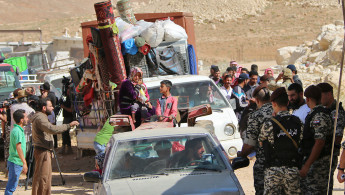Russia looks to coordinate Syrian refugee returns with Lebanon, Jordan
Russia is looking to form a joint committee with Lebanon to coordinate refugee returns to Syria - along with the United Nations and the United States - Lebanon's Daily Star reported on Saturday.
The news comes after a request was made to George Shaaban - advisor on Russian affairs by the Prime Minister-designate Saad Hariri - to communicate with Russian officials in order to understands the details of a proposal announced by Moscow regarding refugee return.
According to a statement on Saturday from Hariri's office, Shaaban met with Russian Deputy Foreign Minister Mikhail Bogdanov, who is also the special representative of the Russian president in the Middle East.
He was briefed on the "details of the specific proposals" announced by Russia a day ago.
The statement added that Hariri welcomed any effort made by Moscow that would lead to "a joint plan for the return of the displaced, especially the return of the displaced from Lebanon and Jordan".
It would also see the formation of a joint working group.
Moscow put forward plans to Washington to cooperate on the return of refugees to war-torn Syria, the Russian ministry of defence announced on Friday, days after a summit between Presidents Vladimir Putin and Donald Trump.
"Specific proposals on how work could be organised to ensure that refugees can return home have been sent to the American side," senior ministry official, General Mikhail Mizintsev, said in a statement.
The proposals "take into account the agreements reached by the Russian and American presidents during their meeting in Helsinki" on Monday.
It could include setting up a Russian-US-Jordanian monitoring group in Jordan and Lebanon, and projects that over 1.7 million Syrian refugees will be able to return home in the near future.
Preliminary assessments indicated 890,000 refugees could return to Syria from Lebanon in the near future, in addition to 300,000 from Turkey and 200,000 from European Union countries.
Syrian refugees would likely be reluctant to return home while the current regime remains in place, wary they would be targeted by its intelligence agents as potential dissidents.
Syria has some of the worst prison conditions in the world, where torture and summary executions are routine.
The Syrian conflict began when the Baath regime, in power since 1963 and led by Assad family, responded with military force to peaceful protests demanding democratic reforms, triggering an armed rebellion fuelled by mass defections from the Syrian army.
According to independent assessments, brutal tactics pursued mainly by the Russian-backed regime, which have included the use of chemical weapons, sieges, mass executions and torture against civilians, amount to war crimes.





 Follow the Middle East's top stories in English at The New Arab on Google News
Follow the Middle East's top stories in English at The New Arab on Google News
![Netanyahu furiously denounced the ICC [Getty]](/sites/default/files/styles/image_330x185/public/2024-11/GettyImages-2169352575.jpg?h=199d8c1f&itok=-vRiruf5)
![Both Hamas and the Palestinian Authority welcomed the ICC arrest warrants [Getty]](/sites/default/files/styles/image_330x185/public/2024-11/GettyImages-2178351173.jpg?h=199d8c1f&itok=TV858iVg)
